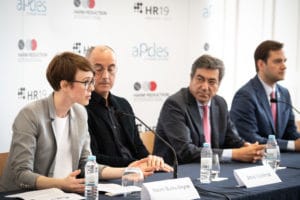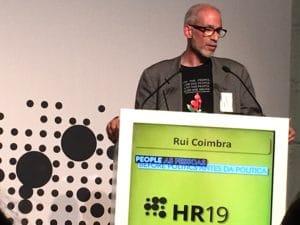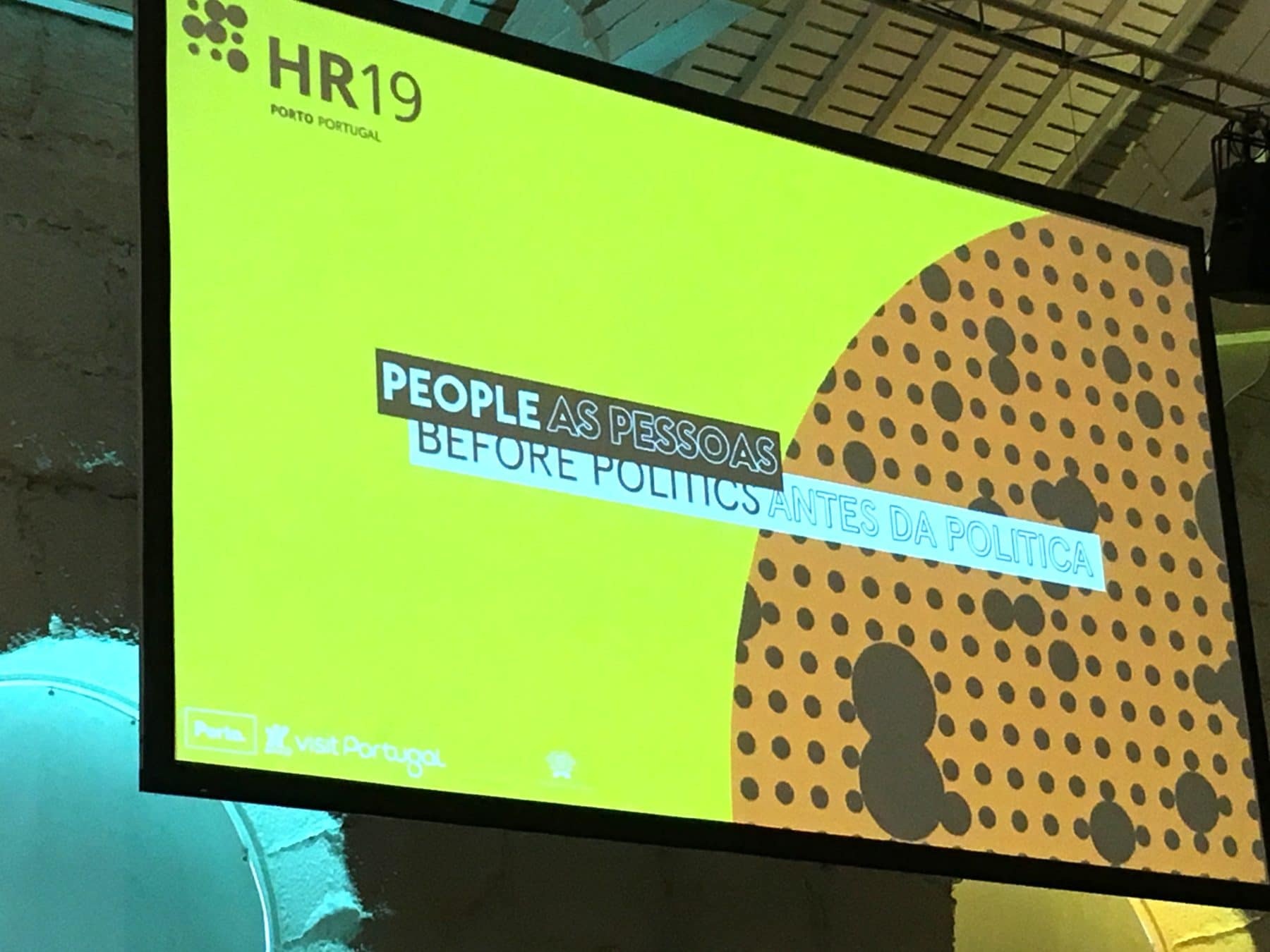To walk down the hill to the Douro River in Porto on a sunny day is to navigate a delightful maze of cobbled streets, bright-patterned houses, stone-walled parks and precipitous steps. Knowing that here—as in all of Portugal—people are never arrested or criminalized for using drugs adds to the sense of paradise.
But that’s a stretch. Rui Coimbra Morais, president of CASO, the local drug users’ union, emphasized that underserved, so-called “hard-to-reach” populations exist here, too. “We don’t want these people to be forgotten; no one should be left behind,” said the psychologist, who is open about his own drug use. “We feel that so many speeches are being made about inclusion; we want to bring some kind of reality … However, I am very grateful to live in Portugal in this model!”
Safe consumption sites (SCS) are a crucial way to help such populations, and Porto doesn’t have one. In the late afternoon of April 28, Rui Moreira, the city’s mayor, took the podium in the cavernous riverside museum venue of the Harm Reduction International Conference, a stern-looking figure in black-framed glasses in front of a sea of harm reductionists. Whispers from Portuguese activists suggested that he was opposed to a mooted SCS, and that his reception was uncertain.
He said that he would need to make a statement in Portuguese, due to the many Portuguese officials and politicians present. After doing so, he translated: “We will be supporting a mobile unit that will assist consumption in the city,” in partnership with the health department and NGOs. “Believe me, it’s not a very easy decision—I’m not more popular than I was five minutes ago!”
The rapturous reception belied this, and the news added to some from Lisbon—which this month implemented its own mobile SCS unit, and “will in the future, next month probably … have two fixed sites,” according to João Goulão, director-general of SICAD, Portugal’s service for intervention in addictive behaviors.

Photo by Nigel Brunsdon [NigelBrunsdon.com]
Challenges and Abuses
This 26th iteration of the conference is “one of the largest international gatherings of harm reductionists ever,” said Naomi Burke-Shyne, Harm Reduction International’s executive director. It involves over 1,200 activists from almost 90 countries, exploring myriad harm reduction issues through plenary sessions, panels, meetings, workshops and side events scheduled over four days.
In her opening speech and at a press conference, Burke-Shyne contrasted real international progress since the first conference in 1990—when a few hundred gathered to learn how HRI founder Pat O’Hare and others had turned a bathroom into Liverpool’s first needle exchange—with continuing frustrations and challenges.
“Many governments and decision-makers continue to sit on their hands,” she said. “Globally, support for harm reduction services has stagnated and is failing to adapt to overdose deaths, new trends in drug use and public health crises,” with lack of funding in low- and middle-income countries a particular problem. And “globally, 99 percent of people who inject drugs face limited or no harm reduction services.” She decried near-universal high spending on law enforcement, “instead of harm reduction policies that have been shown time and time again to save human lives and protect public health.”
Michelle Bachelet, the United Nations high commissioner for human rights, who served two four-year spells as president of Chile and ran the UN Entity for Gender Equality and the Empowerment of Women in-between, quantified this shortfall in national terms. Of 179 countries identified by the Lancet where injection drug use takes place, she noted, only 86 have syringe service programs, while the same number (a slightly different list) have MAT such as methadone.
Worldwide results have been grim. “Between 2000 and 2015, there was a 60 percent increase in drug-related deaths,” said Bachelet. There were 400,000 such deaths in 2015 alone.
“People do not lose their human rights because they use drugs.”
In addition, she said, “We are continuing and in some places increasing human rights violations” in the name of drug control, referencing, like Burke-Shyne, examples such as the Philippines and Bangladesh. “Criminalization of drug use deters people from accessing treatment and other health and social services. The number of people incarcerated worldwide is reportedly at an all-time high of 10 million”—of whom one in five is incarcerated for drug-related reasons, mostly just personal use. And “although prisons represent high-risk environments” for the transmission of blood-borne diseases, “there are even fewer harm reduction services available here” than to the general population.
Bachelet condemned a litany of human rights abuses fueled by the drug war: executions; extra-judicial killings; arbitrary detention; abuses by law enforcement agencies, including targeting of “members of minority communities, LGBT people, people of African descent;” and compulsory “drug detention” centers. She also criticized abstinence-only prevention messages, which “very little evidence” shows to be effective, and denial of pain relief, which “may constitute ill-treatment amounting to torture.”
She brought the house down when she stated, simply: “People do not lose their human rights because they use drugs.”
“When a set of policies clearly fails to achieve its goal,” concluded Bachelet, “it is time to change them.” Of harm reduction policies, she concluded: “The evidence is clear—where they exist and receive adequate funding, they have been markedly successful.”

Michelle Bachelet
A Stunning Success Story
“We’re deeply privileged to be here to learn” from the host country’s example, said Burke-Shyne. “Of course there is continued room for progress, but the world still looks to the reforms that Portugal made nearly 20 years ago.”
It was fitting, then, that the opening day of the conference front-loaded many of those who had instigated and maintained this model, which has been praised for its integrated public health approach, on top of decriminalization.
Jorge Fernando Branco de Sampaio, who was president of Portugal from 1996-2016 and now serves on the Global Commission on Drug Policy, gave the final speech at the conference’s opening session.
“In this very specific issue of drug control, Portugal has a lot to share with other countries and partners,” he said. “Why? Because we have a solid bedrock of evidence to provide about the outcomes of the changes made in our drug policy since the ‘90s, when Portugal was facing a serious opioid epidemic that sparked alarm across all social groups … In these rather dark times dominated by failures and regressions in many fields, it is good to have a success story to tell!”
And how. As he described it: “The number of drug-users decreased; the number of drug-users who entered into voluntary treatment increased; the number of newly reported cases of HIV and AIDS among drug addicts has declined substantially every year since 2001; drug-related mortality rates have decreased as well.”
“Our decriminalization model was based on relationships … on creating common ground between drug users, professionals, law enforcement, politicians,” said José Queiroz, executive director of APDES, a Portugues agency which promotes access to health, education and employment for vulnerable populations, and is co-hosting the conference.
Nodding to earlier examples of harm reduction seen in Switzerland, the Netherlands and parts of the UK, Queiroz said that Portugal’s approach was “based on the ideas of pragmatism, humanism, participation, inclusion.”
“The voyage of discovery has less to do with finding new landscapes than looking with fresh eyes.”
Professor Alexandre Quintanilha, former president of Portugal’s Parliamentary Committee on Education and Science and former director of the Institute of Molecular and Cellular biology at the University of Porto, chaired the commission that produced Portugal’s famed National Strategy on drugs in 1998.
Drug policy wasn’t his specialization. “I was the person who had least knowledge about drugs [on the commission],” he told the crowd. When Portugal’s deputy prime minister called to ask him to chair it, “I laughed!”
But his lack of preconceived ideas about the field was a positive, as Quintanilha illustrated by quoting Marcel Proust: “The voyage of discovery has less to do with finding new landscapes than looking with fresh eyes.”
Having a multi-disciplinary mix on the commission was essential but not easy, he said: “Each discipline has its own specialized words, which they try to make as incomprehensible as possible to show everyone that they’re intelligent.”
But working with open minds and widely consulting the public, they proved that it “is possible to have public policy conceived, based on knowledge and evidence coming from different domains.”
They rented large cinemas to hold public consultations about the new approach. They were so packed out that people were sitting on the floors. “People would come up to us at the end of the meeting, in tears, thanking us … It was very touching, it was very motivating.”
The government accepted the commission’s strategy without changing “a single comma,” publishing it on April 22, 1999—20 years ago almost to the day.
Where Next for Portugal?
Quintanilha acknowledged that the reforms, developed rapidly in the face of a drug-related public health crisis, were not perfect—people who use drugs in Portugal can still be summoned to a “dissuasion committee,” which can impose civil penalties, such as fines or restrictions on freedom of movement.
And Jorge Sampaio echoed this message: “Make no mistake. Successes are not timeless. What was innovative in the past and produced change for the better has to be kept under permanent scrutiny, evaluation and review. Public policies have to adapt to new trends and address emerging and long-term challenges.”

Naomi Burke-Shyne, José Queiroz, João Goulão, Ricardo Baptista Leite [Photo ©Steve Forrest/HRI/Workers’ Photos]
So it’s encouraging to see a new generation of Portuguese politicians take the reins. Ricardo Baptista Leite is a member of parliament for Portugal’s opposition Social Democratic Party—which, despite the name, is a center-right party. He’s also a physician and the founding president of UNITE Global Parliamentarians Network, which works to eliminate HIV/AIDS and other diseases. Quoting one of the conclusions of UNITE’s April 27 Joint Action Policy Day, he told delegates: “Harm reduction and love must have a shared common denominator—they must be unconditional.”
“I couldn’t be happier to endorse the efforts pushing for harm reduction, decriminalization and a people-centered approach that has saved lives in our country,” he said, in words that would be startling if uttered by someone considered right-of-center in US politics. “Drug policy is a fundamental angle to be able to end stigma and discrimination.”
He observed at a press conference, “Twenty years ago, when we were seen as an experiment—now we have proven experience—not all of parliament was in favor of decriminalization … If we were to submit the bill today, we would have unanimous support from all parties.”
Asked about Portugal’s prospects for continuing its drug policy leadership, by advancing in areas like cannabis legalization and SCS, he noted that negotiations with city governments have slowed down implementation of SCS, and added, “Portugal has been leading, but that should not be our main motivation to move forward—our motivation should be to do what is based on evidence to help people.”
Baptista Leite cited his own past opposition to cannabis legalization, before reviewing the evidence about outcomes in other jurisdictions like Uruguay and US states convinced him that it was “all in favor of legalization with a strong regulatory framework.” His party has now adopted this position.
In general, he noted, “the law is not enough,” agreeing with comments from Rui Coimbra Morai that “tailored” harm reduction implementation is additionally crucial to reach marginalized populations on the ground.
“I think that Portugal has a moral duty and a moral responsibility to go further.”
João Goulão, whose role could be described as Portugal’s “drug tsar,” said, “Last year we had an initiative to pass [legalization of] medical cannabis; that was approved. Then we had a proposal for social use—it was not even admitted for discussion.” He cited “political context” as the reason for this—“there is an election coming”—but also expressed, “I believe that we have the tools to fine-tune. I think we do not need further legislative steps as completely necessary to address those new challenges.”
“I think that Portugal has a moral duty and a moral responsibility to go further,” said José Queiroz at a press conference.
And on the stage, Rui Coimbra Morais looked pointedly at Portugal’s secretary of state for health, his fellow presenter, while urging politicians to say “yes” to reform, and to take “the risks that each person can manage.”

Rui Coimbra Morais
“People Before Politics”
Whether or not Portugal continues to advance rapidly, it remains an outlier in world terms. “There are still lots of places where users are living the same war that they were living in the ‘80s and the ‘90s,” said Coimbra.
It is these people who will be the focus of the next few days, with the conference theme “People Before Politics.”
Naomi Burke-Shyne, citing practices like the denial of freedom to NGOs and people being forced from the streets or excluded from housing on the basis of their drug use, described drug policy as a “convenient tool” to harm marginalized people.
She noted that harm reduction is “inextricably linked with issues of race and health” and therefore closely aligned with broader social justice movements. But she also pointed out that “many of these movements are limited by being fed decades of misinformation on drugs”—and that this distinction is what makes the global harm reduction movement unique and essential.
“The most important message—to believe and not to stop—has been achieved.”
One of a number of awards presented at the conference’s opening ceremony went to Andrey Yarovyi, a Ukrainian harm reductionist and advocate for drug users.
In August 2018, he was detained by authorities in the self-styled “Luhansk People’s Republic,” a Russian-backed enclave in eastern Ukraine. They found him in possession of 10 days’ supply of prescribed buprenorphine for his own use. Charged with “large-scale drug trafficking,” he was sentenced to long-term imprisonment and remains incarcerated.
His message to the conference was read out: “Dear colleagues, dear friends … I’m sure we will achieve our goals. The most important message—to believe and not to stop—has been achieved.”





Show Comments